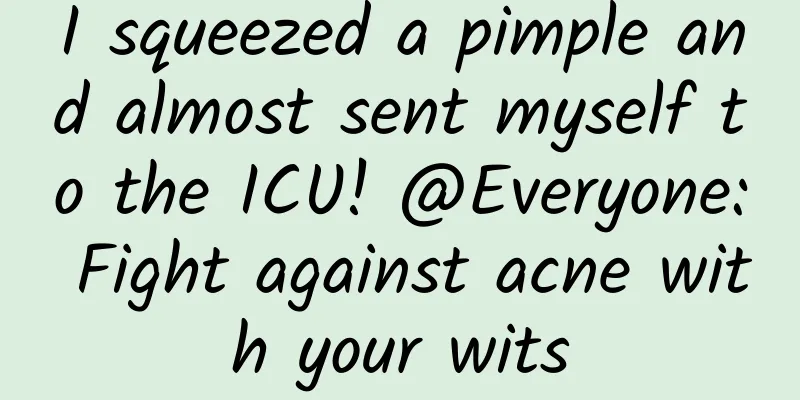I squeezed a pimple and almost sent myself to the ICU! @Everyone: Fight against acne with your wits

|
Many people have experienced "battle acne" Facing acne Many people think: "Just squeeze it out" But this behavior almost put people in the ICU How to deal with annoying acne? Event Backstory Haohao (pseudonym), a 7-year-old boy from Fuzhou, had a noticeable pimple on his nose, so his family helped him squeeze it out. Unexpectedly, a few days later, Haohao's entire nose became red and swollen, and he had a high fever, so his family sent him to the hospital. After a doctor's examination, Haohao was diagnosed with "nasal cellulitis" and was immediately hospitalized for treatment to prevent his condition from getting worse. According to experts, cellulitis is an acute suppurative inflammation of the subcutaneous, subfascial or deep connective tissue, often caused by infections such as Staphylococcus aureus and hemolytic Streptococcus . The nose itself is home to a large number of bacteria. When we squeeze pimples with dirty fingers , pick our noses frequently, or have broken skin, the soft and fragile nasal mucosal barrier can easily be damaged , creating conditions for bacteria to invade. The main symptoms are redness, swelling, pain and fever of the nose . In severe cases, the swelling will affect normal breathing and may even cause swelling around the eyes. (1) Acne in the “danger triangle” of the face Never squeeze pimples in the "dangerous triangle area" from the base of the nose to the corners of the mouth! Because this area is rich in blood vessels and has no venous valves to prevent blood reflux, it is connected to the intracranial cavernous sinus vein. In other words, when we squeeze the pimples hard, bacteria can easily go back into the brain along the veins , causing intracranial infection, meningitis, brain abscess, and even sepsis and septicemia, which can be life-threatening in severe cases. (2) Immature or very deep, hard pimples Do not squeeze immature pimples that have not yet produced white pus spots, or pimples that are very deep and hard! Because the pimples are in the stage of inflammation, or the inflammation is very deep, it is often difficult to squeeze out anything. Forcible squeezing will not only spread the inflammation , but may also leave pits and scars. You can try topical medications , such as anti-inflammatory drugs like benzoyl peroxide gel or fusidic acid cream; but if the effect is not good, or large areas of redness, swelling and acne appear, it is recommended that you go to the hospital as soon as possible. First, prepare the following items: alcohol or iodine, medical cotton swabs, alcohol cotton pads, acne needles, fusidic acid and other antibiotic ointments. (1) Wash your hands and face, and disinfect your skin Use a cotton swab dipped in alcohol or iodine to disinfect the acne and surrounding skin in a circular motion from the inside to the outside. The disinfection area can be larger. (2) Disinfection of items Wipe the needle of the acne needle with an alcohol cotton pad. It is recommended to disinfect it back and forth several times. (3) Correct acne picking This step is critical! The needle should be parallel to the pimple and prick the top horizontally. Be careful not to insert the needle vertically, because it is difficult to control the depth and the dermis will be pierced accidentally, which is easy to leave scars. (4) Popping acne with cotton swab Use two sterile cotton swabs to squeeze both sides of the pimple from bottom to top to squeeze out all the yellow or white contents in the pimple until light red blood flows out. (5) Follow-up care After squeezing the pimple, disinfect the pimple and surrounding skin from inside to outside with alcohol or iodine cotton swab again. After drying, apply fusidic acid cream or other antibiotic ointment on the wound to prevent inflammation and inhibit bacteria. After the wound heals, you can apply retinoic acid ointment to prevent acne marks and reduce the recurrence of acne. Be careful when popping acne "Fighting acne" requires "outsight" Acne, a seemingly small problem There are risks that are easy to overlook Learn the correct techniques and care for popping acne To keep your skin healthy and beautiful This is the end of this issue Want to see more interesting and practical content Follow me now Source: Popular Science, Fuzhou Evening News, Shenzhen Institute of Dermatology. The cover image and images within this article are from the copyright gallery Chuangke Post. Reprinting and using them may lead to copyright disputes. For reprinting original images and texts, please reply "reprint" in the backstage. |
<<: The "giant" that captures sunlight draws the "green miracle" of Ulan Buhe
>>: Found it! It is the director of the earth's 485 million years of climate change
Recommend
Chinese medicine prescription for lactation
In daily life, when it comes to promoting lactati...
The efficacy and function of Guafu Wood
There are many kinds of common Chinese medicinal ...
This "smallest organ in the human body" cannot be ignored when injured!
《Cotton Swab Medical Science Popularization》 Xia ...
The efficacy and function of the root of Qi Da Gu
The traditional Chinese medicine Lacquer Root is ...
New sound-sensing fabric - this "sweater" can hear your heartbeat
Recently, engineers from the Massachusetts Instit...
This kind of "shrimp" is poisonous, and blue whales can swallow a whole group of them in one bite
Review expert: Li Weiyang, well-known popular sci...
The lightning killer cheetah turns out to be a big cowardly cat!
This fastest animal on earth is gradually disappe...
How can an undersea tunnel built between two places “run in both directions”?
From Ningbo to Zhoushan, a project is under const...
We also have a heavy ion accelerator for cancer treatment!
Audit expert: Luo Huiqian Researcher at the Insti...
How to use snow lotus?
We all know that snow lotus is a precious Chinese...
Fish bone stuck in throat, swallow rice and drink vinegar?
Popular saying: Many people have experienced fish...
Is it effective to drink Chinese medicine angelica in water?
There are many types of Chinese medicinal materia...
What are the side effects and contraindications of wolfberry?
Although wolfberry is loved and recognized by man...
Meteorological Analysis | Overview of Mohe Winter Climate in 2020/2021 under the Background of La Niña
Text/Photo by Wu Shusen La Niña is a climate phen...









![The efficacy and function of Magnolia officinalis[picture]](/upload/images/67ca485ea44f8.webp)